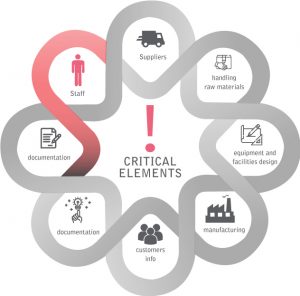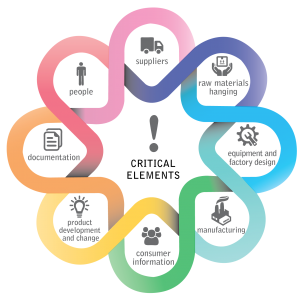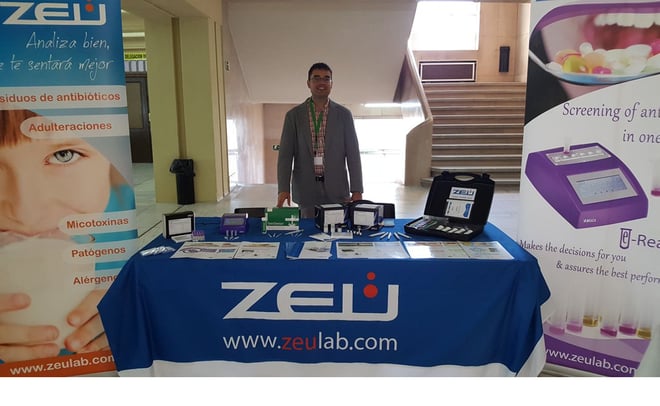
Good allergens management is not possible without bearing in mind the staff, from the top official, the staff which produce the alimentary products, cleaners to the visitors. We must mainly take care of two aspects: an adequate training in allergens and a good hygiene.
Allergens management in the food industry II: Staff
PROTEON DUO MILK EXPRESS, the only rapid test that identifies the two main allergens in milk
ZEULAB launchs PROTEON DUO MILK EXPRESS, an easy, rapid, and reliable test for dual detection of β-lactoglobulin and casein in foodstuff, rinse water and surfaces. Specially designed for the food industry and related businesses.
Main characteristics of the test:
- Double rapid test: milk and its by-products detection in 10 min.
- Versatile: valid for highly processed food.
- Simple:no previous training or additional equipment are required
- Economic: 2 detections with only one rapid dip-stick test.

Advantages and disadvantages of the main analytical methods used in allergen management
Jul 14, 2017 11:50:24 AM / by admin posted in Analytical methos, ATP, Control, Cross contamination, Allergens, Proteon Express, Rapid Test, Test LFIC, zeulab
Analytical methods are needed for a correct management and control of potential allergen cross-contamination, as well as the reinforcement of the quality of the manufacturing and cleaning processes.
According to European regulation No 1169/2011, it is mandatory to report specific allergens present in a product.
Direct methods are recommended because they allow the detection of specific allergenic proteins, avoiding false positives, because they are able to distinguish accurately the presence of a particular allergen.
Management of allergens in food industry
 Food allergies are the exaggerated response of our immune system against the consumption, contact or inhalation of a food, its derivatives or an additive contained in the same. There is an increasingly important public health problem since its prevalence is increasing.
Food allergies are the exaggerated response of our immune system against the consumption, contact or inhalation of a food, its derivatives or an additive contained in the same. There is an increasingly important public health problem since its prevalence is increasing.
Management of allergens in the food industry is not a new system, but it is already an integral part of the food security control. An effective allergen management system should take into account all operations, from the supply of raw materials to production, handling or packaging.
Zeulab takes part in the IV Food Quality & Safety International Congress Acofesal
Jun 26, 2017 11:19:14 AM / by admin posted in Antibiotics detection, Food analytical control, Food insdustry, Accreditation, Accreditations, Acofesal, Allergens
The overall level of the presentations and round tables, as well as the participation, was elevated, demonstrating the great interest aroused by the proposed subjects.
The presence of representatives of the food industry, distribution, catering industry, research centers, public and private laboratories, as well as certification entities, consulting companies and consumer associations, shows once again that food safety is a very topical issue.
Analytical methods of allergen detection
May 5, 2017 9:57:13 AM / by admin posted in Analytical methods, ATP, food, Food and Drink Europe, allergen detection, Allergens, Inmunochromatographic, Proteon, Surfaces
Food allergens are components of foodstuff and additives that when digested, in contact or inhale cause an immune reaction known as food allergy.
Although some allergies occur more frequently than others, and there are about 160 foods that can cause allergic reactions, the most common ones are those to the cow milk, eggs, legumes (including soy), wheat/gluten, fish, shellfish, fruits, and nuts, such as peanuts and walnuts.
Analysis of allergens on work surfaces: “cotton cheats”
Apr 28, 2017 8:52:36 AM / by admin posted in Analysis of allergens, Control of allergens, Cross contamination, Elisa Test, Allergens, Labelling, Rapid Test, Work surfaces., zeulab
Have you ever wondered if the cleaning that you do is really effective? The answer is especially important when we talk about cross-contamination through food allergens.
Allergens on surfaces: A source of Cross-contacts control in allergen management
Dec 18, 2014 12:23:29 PM / by admin posted in allergens in food, allergy management, allergy testing, allergy testing kits, allergy tests, Cross contamination, eu food regulations, Food allergen detection, food allergen detector, food allergens, food allergies, food allergy detection, food information for consumers, food labelling regulations, food microbiology testing, food processing, food testing methods, gluten free diet, allergen detection, allergen extraction, allergen food detection, allergen legislation, allergen management, allergen testing food industry, allergen testing kits, Allergens, HACCP, Hazard analysis and critical control points, hidden allergens, most allergenic foods, new allergen laws, regulation
The countdown to the coming into force of Regulation (EU) 1169/2011 starts. From 13th December of this year, all commercialized food has to highlight if any allergens of mandatory mention are present in their composition. Even unpackaged food and menus offering in catering or restaurants are included in this regulation.
EGG ALLERGY: NEW ELISA TESTS FOR EGG DETECTION
Jul 24, 2014 12:55:25 PM / by admin posted in Cross contamination, Egg allergy, Food allergen detection, food allergies, Food allergy, Allergens, NIST 8445, Ovalbumin, Ovomucoid, Sandwich ELISA
Food allergy involves adverse reaction of immunity system to determined foods (mostly proteins). Food allergies represent an important health problem affecting mainly children (6-8%). Symptoms can vary form mild (hives) to severe reactions such as anaphylaxis. The amount of food allergen that can trigger an allergic reaction is different in each patient and trace of allergens (little microgram) can be enough to induce a reaction. Hence, rigorous information about foods that contain allergens is very important to allow allergic people manage their diet.
Celiac patients would improve their quality life.
Jan 14, 2013 8:56:10 AM / by admin posted in Gluten, Allergens
Chinese, German and north American researchers has been able to produce what varieties compatible for celiac patients. Gluten is a complex mixture of several proteins known as gliadins. In a single bread wheat variety is comprised of up to 45 different gliadins. Some of these proteins induce an autoimmune reaction in celiac patients. The only effective therapy is strict dietary abstinence from food with gluten , but is quite difficult to comply with. Besides, following a gluten-free diet has adverse influence on gut microbiota causing digestive problems. In this work, researches have been avoiding the expression of the enzyme that controls the synthesis of some gliadins. These wheat varieties showed a 76.4% reduction in celiac response gliadins. It is has claim that these modified wheat would be able to bake food suitable for celiac patients. In addition patients would allow consume non immunogenic gluten avoiding adverse effects of a gluten free diet.
, but is quite difficult to comply with. Besides, following a gluten-free diet has adverse influence on gut microbiota causing digestive problems. In this work, researches have been avoiding the expression of the enzyme that controls the synthesis of some gliadins. These wheat varieties showed a 76.4% reduction in celiac response gliadins. It is has claim that these modified wheat would be able to bake food suitable for celiac patients. In addition patients would allow consume non immunogenic gluten avoiding adverse effects of a gluten free diet.




